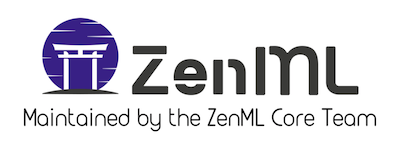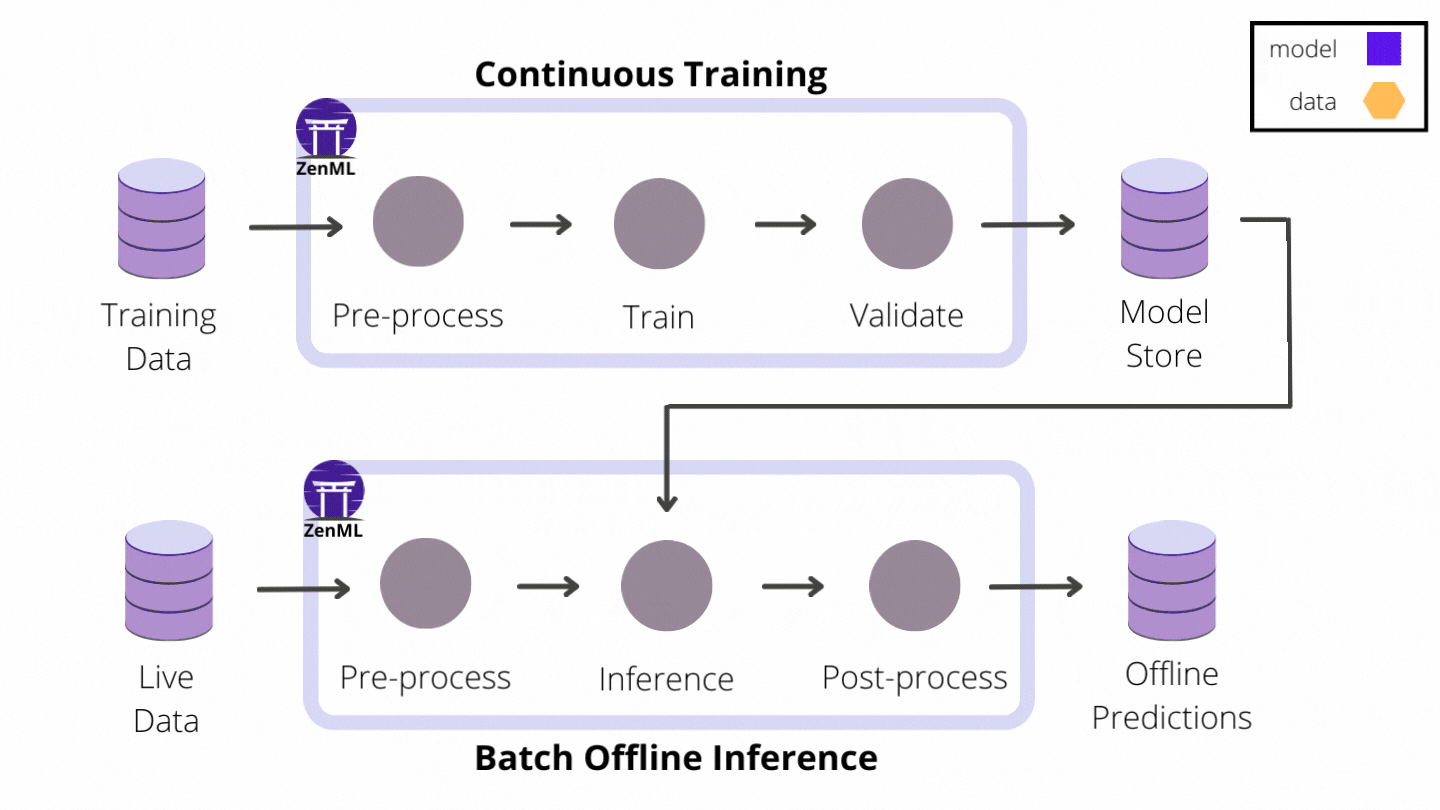
Deploy ZenML (Open-Source MLOps Framework & Pipeline Orchestration Tool)
ZenML [Feb ’26] (ML Pipelines, MLflow & Airflow alternative) Self Host
zenml-railway
Just deployed
MySQL
Just deployed
/var/lib/mysql

Deploy and Host Managed ZenML Service with one click on Railway
ZenML is an open-source MLOps framework designed to make machine learning (ML) workflows reproducible, collaborative, and production-ready. It integrates seamlessly with existing ML and data science tools like TensorFlow, PyTorch, Scikit-learn, and MLflow. With ZenML, teams can orchestrate their ML pipelines while keeping code modular, versioned, and deployment-friendly. ZenML is actively maintained and available on ZenML GitHub.
About Hosting ZenML on Railway (Self Hosting ZenML on Railway)
You can self host ZenML to maintain complete control over your ML workflows, pipelines, and metadata, without relying on third-party servers. By deploying ZenML on Railway, you get the flexibility of open-source software with the convenience of managed hosting. Railway automates scaling, monitoring, and environment management, while you focus on building ML solutions.
ZenML self-hosting allows you to:
- Keep your ML workflows private and secure.
- Deploy pipelines tailored to your team’s data infrastructure.
- Reduce dependence on vendor lock-ins.
- Enable collaboration across teams with reproducible pipelines.
Why Deploy Managed ZenML Service on Railway
Deploying a managed ZenML service on Railway provides effortless setup, scaling, and simplified maintenance of your MLOps workflows. Unlike traditional VPS hosting, Railway takes care of operational complexity while letting you enjoy the full power of ZenML.
Railway vs DigitalOcean
On DigitalOcean, you need to manually configure servers, set up ZenML Docker environments, and manage dependencies. On Railway, deploying ZenML takes just one click with built-in scaling, CI/CD pipelines, and infrastructure automation.
Railway vs Linode
Linode offers raw servers that require manual patching, storage configuration, and scaling setup. Railway automates updates and offers a clean interface for managing ZenML deployments.
Railway vs Vultr
Vultr requires you to monitor disk I/O, memory, and scaling configurations for your ML pipelines. Railway abstracts away these challenges, letting you focus only on building workflows.
Railway vs AWS Lightsail
AWS Lightsail involves extra networking complexities and manual scaling steps. With Railway, your ZenML deploy is instant and scales automatically as your pipelines grow.
Railway vs Hetzner
Hetzner provides cost-effective bare-metal servers but expects you to manage every aspect of system setup. Railway removes the sysadmin burden and ensures ZenML runs in secure, managed containers.
Common Use Cases for ZenML
Here are 5 common use cases for self-hosted ZenML:
- End-to-End Machine Learning Pipelines: Orchestrate reproducible ML workflows including data ingestion, preprocessing, model training, and deployment.
- Experiment Tracking: Compare and log different experiments easily with ZenML’s integrations.
- CI/CD for Machine Learning: Automate the deployment of ML models with seamless pipeline execution.
- Collaboration in ML Teams: Provide shared reproducible workflows across data scientists and engineers.
- MLOps with Compliance: Maintain complete data governance, reproducibility, and auditability for ML pipelines.
Dependencies for ZenML Hosted on Railway
To host ZenML on Railway, you need:
- Python Runtime: ZenML is built in Python, so a modern Python runtime is essential.
- Database: ZenML uses metadata stores (Postgres, MySQL, or SQLite) to manage pipelines.
- Docker: For isolated, reproducible environments.
Deployment Dependencies
Railway automatically provisions:
- Postgres Database for metadata tracking.
- Docker-based runtime for ML pipelines.
- Secure storage for ML artifacts.
Environment Variables
Set up environment variables for ZenML:
ZENML_STORE_URL: Postgres or MySQL connection string.ZENML_ARTIFACT_STORE: Storage backend for ML artifacts.ZENML_SECRETS_STORE: Credentials management.

How ZenML Compares to Other MLOps Tools (Alternatives to ZenML)
MLflow vs ZenML
- MLflow: Primarily focused on experiment tracking and model registry.
- ZenML: A broader MLOps framework providing pipeline orchestration, reproducibility, and integration with multiple tools (including MLflow).
ZenML can use MLflow as a plugin for tracking, making them complementary rather than competing.
ZenML vs Airflow
- Airflow: General-purpose workflow orchestration, not ML-specific.
- ZenML: Built specifically for machine learning workflows with ML-native abstractions.
Other Alternatives
- Kubeflow: Heavy, Kubernetes-centric.
- Metaflow: Strong for workflow management, but less modular.
- ZenML: Lightweight, modular, and easy to integrate.
ZenML Features
- Pipeline orchestration with modular steps.
- Metadata and artifact tracking.
- Plugin-based architecture (integrates with MLflow, GCP, AWS, Hugging Face, etc.).
- CI/CD integration for ML models.
- Secrets and environment management.
- Multi-user collaboration support.
ZenML Funding and Adoption
ZenML has raised funding to scale its open-source MLOps framework. You can find company details on ZenML Crunchbase. With backing from investors, ZenML continues to expand its documentation, ecosystem, and community.
Official Documentation
Comprehensive installation and usage guides are available on the ZenML documentation.
How to Use ZenML
- Install ZenML: Run
pip install zenml. - Initialize Project: Run
zenml initinside your ML project. - Define Pipelines: Create modular steps (data load, preprocess, train, evaluate).
- Run Pipelines: Trigger your pipelines with
zenml pipeline run. - Deploy Models: Use ZenML integrations for serving models in production.
How to Self Host ZenML on Railway
Step 1: Clone Repository
Clone the ZenML GitHub repository.
Step 2: Setup Railway Project
Create a new Railway project and link your GitHub repo.
Step 3: Configure Environment Variables
Add database and storage environment variables inside Railway.
Step 4: Deploy
Click Deploy Now and Railway will provision the environment for your ZenML service.
Step 5: Access ZenML Dashboard
Once deployed, access ZenML’s interface via the Railway-generated domain.
Cost of Self Hosting ZenML on Railway
- Base app instance: $5–$10/month.
- Postgres add-on: $5/month.
- Storage: Based on usage.
This is far cheaper compared to managed ML platforms.
Self Hosting ZenML vs Managed Cloud Services
- Self Hosting ZenML: Free, open-source, complete control.
- Cloud MLOps Platforms: Paid, vendor lock-in, limited customization.
Self hosting ZenML is ideal for startups, research labs, and enterprises who want control and cost savings.
FAQs
What is ZenML?
ZenML is an open-source MLOps framework for building reproducible, collaborative machine learning workflows.
How do I self host ZenML?
You can self host ZenML on Railway by deploying a Dockerized instance with Postgres and storage configured.
What are ZenML’s key features?
ZenML offers pipeline orchestration, metadata tracking, integrations with ML tools, secrets management, and CI/CD for ML workflows.
How does ZenML compare to MLflow?
ZenML focuses on pipeline orchestration, while MLflow focuses on experiment tracking. They can be used together.
How does ZenML compare to Airflow?
ZenML is ML-specific and lightweight, while Airflow is general-purpose and heavier.
Where can I find ZenML’s source code?
The source code is available on ZenML GitHub.
How much does it cost to self host ZenML on Railway?
On average, $10–$20/month including Railway app instance, Postgres, and storage add-ons.
Where can I find more resources?
Official documentation: ZenML Docs
🚀 Ready to start your MLOps journey?
Template Content
zenml-railway
Shinyduo/zenml-railwayMySQL
mysql:9.4
